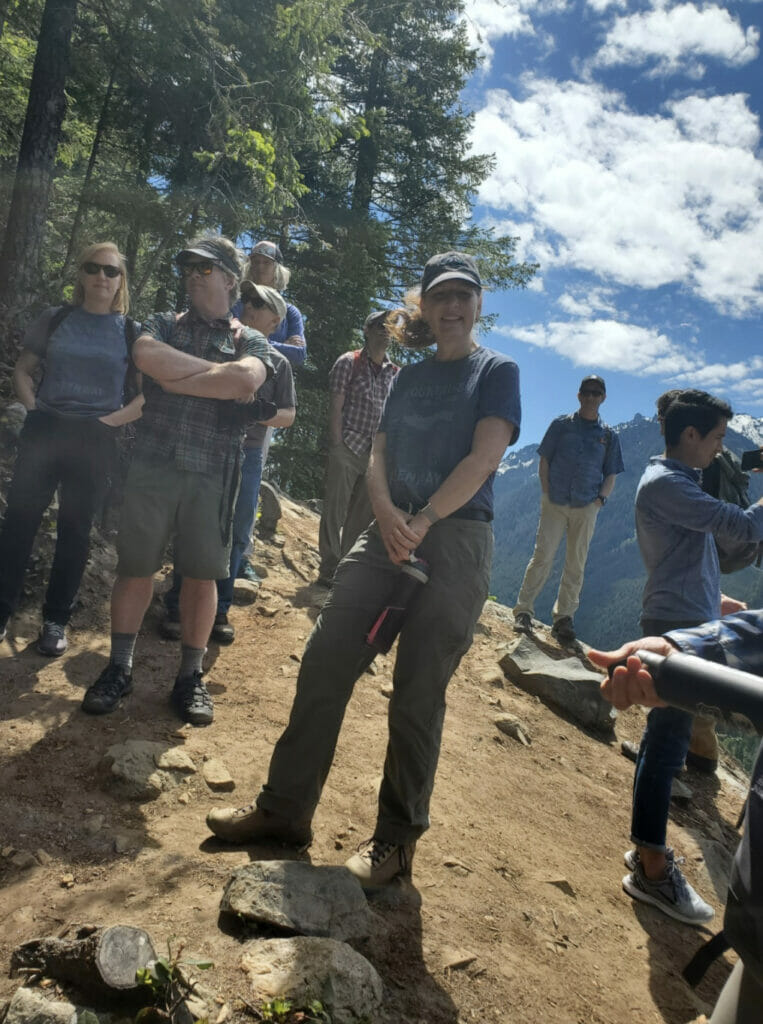U.S. Rep. Kim Schrier champions bill that grants more funding for national forest management
By Steve Miller
Recently, I was fortunate to have been included in a group invited to ‘take a hike’ with U.S. Rep. Kim Schrier (D-Washington) to discuss TU’s support for her proposed Legacy Roads and Trails Act.
Rep. Schrier loves and values the many opportunities we have in the Northwest to enjoy the outdoors — she’s an avid hiker. Her legislation would reinstate the Legacy Roads and Trails Program, bringing back a program that was critical to restoring the watersheds and habitat that makes fishing on U.S. Forest Service lands so satisfying.
Established by Congress in 2008, the LRT program enabled the Forest Service to manage, repair and at times retire key infrastructure on public lands. The new Legacy Roads and Trails Act, introduced by Schrier with her colleagues Reps. Mike Simpson (R-Idaho) and Derek Kilmer (D-Washington) in April, aims to leverage public and private funds to restore deteriorating infrastructure while also preserving water and habitat for communities and native fish.
Unfortunately, the need for this kind of legislation has grown more urgent in recent years. National forests contain 60 percent of the blue-ribbon trout rivers and streams in our country. But they are seriously threatened by the recent increase in the size, number and intensity of forest fires.
Inadequate funding in the Forest Service’s Pacific Northwest Region has led to widespread degradation of the almost 90,000 miles of roads, bridges and trails that stretch across Washington and Oregon. Loss of visitor access, damage to recreational fishing and severe erosion are all consequences created by this lack of funding.
There are at least two outcomes of these large fires that most people aren’t generally aware of.
The first is that big fires frequently destroy or seriously degrade many of the roads, bridges and trails the Forest Service owns and manages. This increases both the maintenance workload and the need for the financial resources to support this work.
The second outcome? The Forest Service has had to shift ever larger amounts of its budget to fighting these fires, rather than undertaking other necessary work, such as maintaining roads and trails. Fires result in a simultaneous increase in the amount of maintenance work needed and a sharp drop in the funds required to do the work.
Inadequate funding of the Forest Service’s Pacific Northwest Region has led to widespread degradation of the almost 90,000 miles of roads, bridges and trails that stretch across Washington and Oregon. Loss of visitor access, damage to recreational fishing and severe erosion are all consequences created by this lack of funding.

Before it was discontinued in 2018, the Legacy Roads and Trails program sought to mitigate these problems by targeting the highest-priority, locally-supported projects to improve public access and create good community-based jobs. It was instrumental in protecting and restoring key water and road infrastructure and improving water quality for salmon and trout species across the United States.
The program spurred the restoration of the South Fork Tolt Watershed, which supplies one hundred million gallons of water per day to almost half of the residents of Seattle. Projects like this are examples of the transformative and far-reaching impacts of the LRT program.
To ensure that at-risk rivers and endangered fish populations are protected in the face of crumbling public infrastructure, Reps. Schrier, Simpson and Kilmer have come together to introduce legislation (H.R. 2816) that will codify the Legacy Roads and Trails Act. This bill will allow the Forest Service to carry out critical maintenance, road relocation and decommissioning, and associated activities on the Forest System’s roads, trails and bridges. It will also reconnect habitat for fish and other aquatic species by removing or replacing unnatural barriers, like faulty culverts, while prioritizing the protection and restoration of threatened fish and wildlife habitat.
Passing this bill will provide the Forest Service with funding needed to restore and maintain our watersheds and key public land infrastructure.
Rep. Schrier also successfully secured language to reinstate the Legacy Roads and Trails program in the House Transportation bill, which passed last week.
Steve Miller is the conservation co-chair for the Washington state council of Trout Unlimited.



